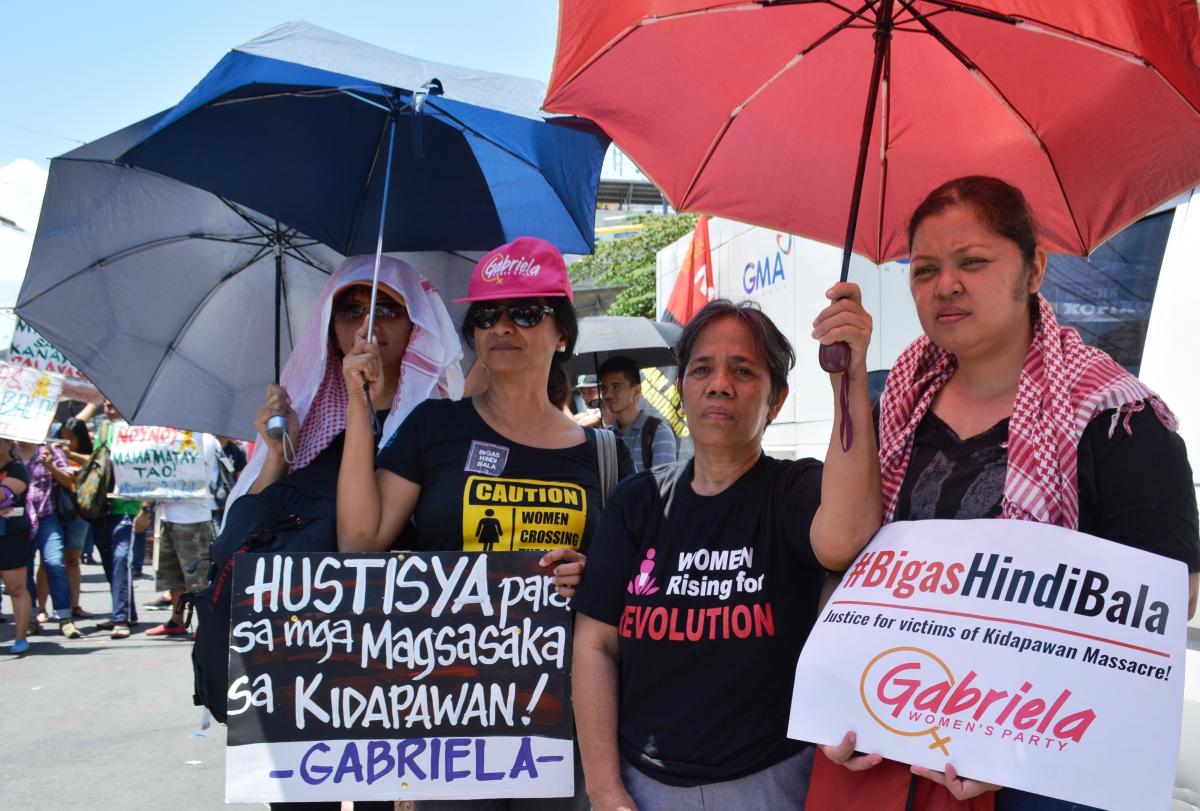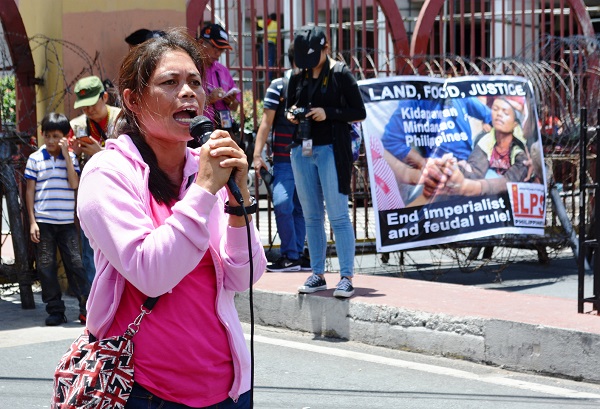By Osang Langara
Extreme weather is displacing communities and putting emergency food aid at the center of women’s community organizing in the Philippines. From Dec. 2015 – Apr. 2016, more than 29,000 people were in need of food aid because of the drought in North Cotabato, Central Mindanao which provides over 40% of the country’s food supply. Yet, as communities struggle to meet basic needs, they must also battle for their basic right to speak out. After a severe 5-month drought, farmers and indigenous peoples led a peaceful protest to demand the long-promised food aid, but the police responded violently—leaving two farmers dead and many more, including women, injured or unlawfully arrested. Despite the temporary release of the protesters after posting bail, JASS and allies in the Philippines continue to demand for the government to provide food aid to support affected communities.
In January, the provincial government declared a state of calamity so that emergency funds could be released to help farmers. But the assistance never materialized. And so, the people organized and took action.
On March 30, 2016, around 6,000 farmers and indigenous Lumad peoples, including many women, from different towns in the province marched to the capital, Kidapawan City, to ask for food relief from the government. Setting up a peaceful barricade at the Cotabato-Davao Highway, they demanded that 15,000 sacks of rice be distributed. They also requested seedlings, fertilizers, and pesticides—so they could plant once the rains resumed—or money, if conditions did not become fit for planting. Instead, they were promised just three kilos of rice per person, for three months. Despite their efforts to negotiate with the provincial governor and other local officials, they made no progress in getting their demands met. “My head is constantly in pain just thinking about where to get food for my family to eat. When we have eaten all of our corn reserves, we have no choice but to ask for help from the government,” explained a woman protester.
On April 1st, the third day of their peaceful action, the Philippine National Police (PNP) arrived to break up the gathering. Before the farmers could even get children and the elderly to safety, the police hosed down the crowd with water cannons, and hit the farmers with batons. As seen in this video during the protest, Bai Ali Indayla from GABRIELA Women’s Party demanded to the police, “What the people want is rice, not your police batons!” Bai is among the women who were on the frontlines of the protest and ongoing struggle. She recalls, “I saw the violence firsthand because I was in front of the barricade. The police hit and shoved the farmers, including women. They used water cannons to drive us away. Because of the intense beating that the farmers and indigenous peoples suffered, some of the protesters threw stones to defend themselves. But the next thing we heard was gunshots! I saw how two of our fellow protesters fell. One was shot in the face and did not survive. The other one was taken to the hospital. He died while being treated.”
The farmers sought refuge at the nearby United Methodist Church compound. According to the protesters, the police followed them and continued shooting near the gate. In some cases, the police deceived people. As 22-year old—and six-month pregnant—detainee Eliza told it: “The police asked us to go with them. [They said] they will help us get a medical check-up. They also said they’ll feed us and then they’ll bring us home. They said we should not be scared of them because they will not harm us.” But things turned out very differently. “Around 2pm I was taken to the hospital. After which I was sent [to] the city gym where they held all of those whom they promised to bring home. We later found out we were being charged with direct assault.”
By the end of the bloody incident, 2 farmers were dead, 162 had been injured, 78 were unlawfully arrested and detained, and 87 were missing. Among those detained were 29 women, including 3 pregnant women, and 6 elderly.
Officials Discredit Protesting Farmers to Turn the Public Against Them
Local government officials justified the violence by saying that the police had intervened to disperse people who were blocking roads—preventing normal traffic and affecting businesses. They implied that the protesters were aiming to sabotage local commerce and embarrass the government. The police even claimed that the some of the protesters carried weapons. The day after the bloody dispersal, the North Cotabato PNP obtained a search warrant to look for guns in the United Methodist Church. They found none.
This practice of discrediting protestors with false accusations is often used to suppress the demands of the communities in this area. According to GABRIELA Women’s Party representative, Emmi de Jesus, blaming farmers and planting evidence are tactics that the Aquinos (the Philippine president’s family) have used repeatedly, from the 1987 Mendiola massacre to the 2004 Hacienda Luisita massacre.
The Philippines has a long history of silencing small farmers—and poor and marginalized peoples more generally—through repressive tactics and discrediting their leaders. As the Kidapawan City incident shows, shooting at peaceful demonstrators; illegal arrests; and arbitrary detention, intimidation, and harassment continue to occur with impunity.
Condemning the Violence
 Despite official messages about events, there has been a public outcry about the bloody dispersal. Hundreds of local and international organizations condemned the killings and the violence. Supporters of the Kidapawan victims launched the #BigasHindiBala (#RiceNotBullets/#FoodNotBullets) campaign, to spread information and to counter media messages peddled by the police and government.
Despite official messages about events, there has been a public outcry about the bloody dispersal. Hundreds of local and international organizations condemned the killings and the violence. Supporters of the Kidapawan victims launched the #BigasHindiBala (#RiceNotBullets/#FoodNotBullets) campaign, to spread information and to counter media messages peddled by the police and government.
On April 4-6, 2016, justice groups in the country led a National Fact-Finding and Humanitarian Mission (NFFHM). The mission’s findings reveal that “the farmers’ demands and protest actions against the government—demand for immediate relief and a clear plan to mitigate the effects of the drought—were legitimate, reasonable and urgent.” The mission also found that the “state security forces, with the approval of, if not direct orders from top civilian authorities, deliberately and murderously attacked the protesters, grossly violating the farmers’ civil and political rights, as well as the right to religious freedom of the United Methodist Church.”
On April 8, a week after the Kidapawan dispersal, women’s groups—including JASS Southeast Asia—joined the Global Day of Action for Food, Land and Justice. Farmers’ organizations led by KMP (Kilusang Magbubukid ng Plipinas or Peasant Movement of the Philippines) organized this Global Day of Action wherein “sympathy” barricades and protests across the country were held to condemn the Kidapawan bloody dispersal. International friends and allies across the globe also held solidarity actions to express their support. JASS Southeast Asia also released an urgent action statement calling for an end to the persecution and criminalization of defenders and peaceful protesters, and the government to provide relief to all people affected by the drought.
Misty Lorin, deputy secretary-general of GABRIELA, commented, “This day should also be declared … a Global Day of Shaming where we should highlight not only the criminal neglect of the Aquino government for our country’s food producers who suffered the brunt of the El Niño. This is reminiscent of the typhoon Yolanda (Haiyan) which exposed corruption, incompetence and insensitivity of the Aquino government. It is a shame to let the farmers go hungry and even a greater shame to meet the demands for rice with bullets.”
The push back continued when women’s groups organized vigils in communities to express their support for the farmers. They also picketed in Manila to demand that the North Cotabato governor, Taliño-Mendoza, and the PNP personnel involved in the violence, be removed from office. They initiated petitions, and demanded the immediate release of relief for farmers in North Cotabato and other El Niño stricken areas.
The protesters were temporarily released from jail, after posting bail, but the demand for food aid and drought relief continues. Find out more about and join JASS’ partners and allies in the Philippines—from people’s organizations and women’s groups such as the Center for Women’s Resources (CWR), GABRIELA, SAMAKANA (Organization of United Urban Poor Women), and others—continue to call for justice for the farmers and indigenous peoples.
Data Source:
Protesters’ quotes came from interviews made by Cham Perez, researcher at the Center for Women’s Resources Philippines, for the National Fact-Finding and Humanitarian Mission held from April 4-6, 2016 in Kidapawan City, North Cotabato, Philippines
Photo Credits: Center for Women’s Resources


























